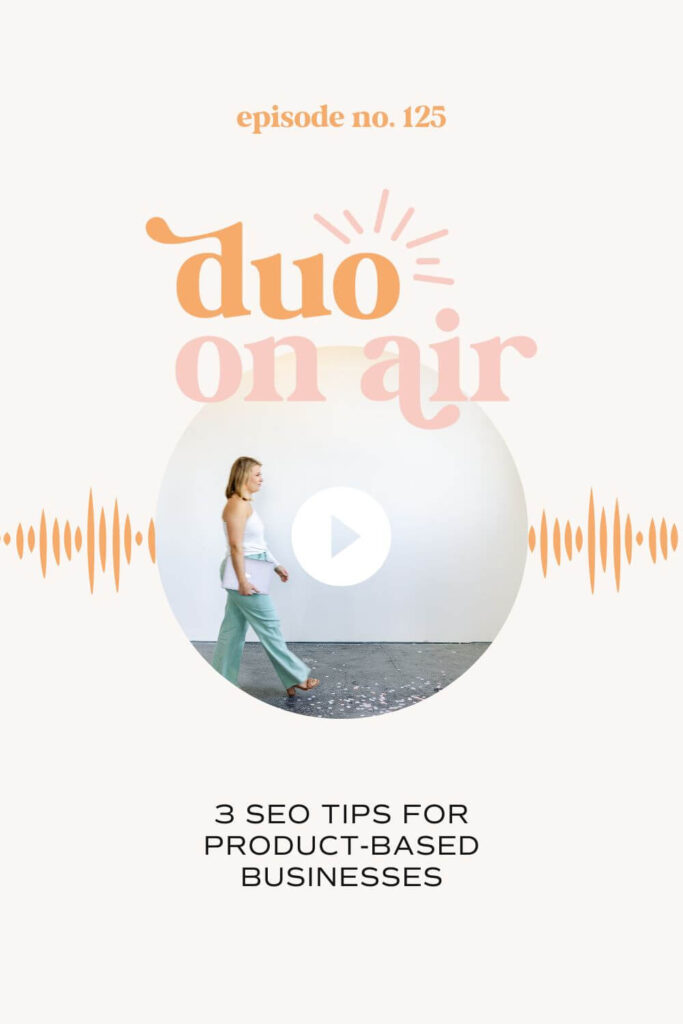Apple Podcasts | Spotify
Product-based e-commerce businesses, this episode is for you. We want to share three SEO tips for product-based businesses. Of course, this is all based on what we’ve seen from our own client’s SEO successes. We’ve worked with all kinds of companies, and our SEO tips do vary depending on whether you have a product-based business or a service-based business. So let’s get into it!
1. Optimized Product Pages
Are your product pages optimized? We often see business owners skip this step because it’s a lot of work. They optimize their main pages (home, about, contact, etc.) but not their product pages. There’s just so many!
But it’s important to optimize every page on your website, considering these stats:
- “98% of shoppers have been dissuaded from completing a purchase because of incomplete or incorrect product information.”
- 53% of shoppers start their product searches on Google, making organic search a crucial source of traffic for product pages.
A product page can often be the first point of contact for potential customers. If they’re searching for a specific product, they’ll land on that product page, not the home page (assuming the product page is optimized 😉)
Well-optimized product pages can significantly impact conversions and sales. You’re improving your chances of qualified customers landing on your product page and purchasing.
So, what should you keep in mind when optimizing these pages?
Avoid Duplicate Content
Don’t copy and paste information from one page to another. Google sees this as spammy and it can hurt your SEO. Write original copy on each product page. This rule also includes your metadata. Write original SEO titles and meta descriptions.
Focus on Benefits
Focus on benefits, not just features. People are searching for the answers to their problems. You want to explain how your product solves the problem the customer is facing.
Keyword Research
Perform keyword research for each product page to find keywords that will help you rank higher in search results. In episode #48, we share our four favorite free keyword research tools.
Word Count
Try to write at least 300 words. Typically, 300 words are enough for Google to understand the content of the page / your product. If you’re struggling to write a 300-word description, add an FAQ about the product to boost the word count.
Formatting is Key
Use headlines, bullet points, and short paragraphs. We can almost guarantee people will be skimming the product page to see if it will meet their needs. Use different styles and formatting to help them understand your product better and faster.
Always Write for Humans First
Yes, it’s important to optimize your product pages for search engines. But remember, humans are the ones purchasing from you! Write your product pages to speak to them.
2. Create Keyword-Driven Category Pages
One of our favorite examples is for our client, NAZ Parure. They sell gorgeous, dainty, gold-filled jewelry, and we saw a huge opportunity for people searching for waterproof jewelry. Well over half of their existing products had this benefit, but we didn’t have a category for it.
We added a new category due to the keyword opportunity of “waterproof jewelry” and this page now drives 76% of all their website traffic!
Why Should You Care About Your Category Pages?
Think of categories as central hubs for product discovery. They are like mini home pages for the products that fall under that category. They also often rank higher than individual product pages. Individual product pages are usually optimized for a niche keyword, while category pages are optimized for a more broad keyword.
Tips for Creating Category Pages
1. When coming up with categories, start broad, then narrow in. Think of a few main buckets the majority of your products fall under.
2. Analyze your competition. What keywords are they trying to rank for? What categories do they have, and what’s an area they’re missing out on?
3. Use keyword research (like waterproof jewelry). This can help you decide the best categories for your products!
4. Ask your customers. Do a fun poll on Instagram to include them in picking your main categories.
5. Keep your navigation clean. Don’t create too many categories and clutter your main navigation menu. Make it easier for people to find what they need.
6. Beware of keyword-stuffing categories. Use the keyword naturally on your category pages. There’s no need to use it a million times – in fact, it will hurt your SEO to do so.
3. Invest in Creating Rich Long-Form Content
This is one of our favorite SEO tips for product-based businesses because not many product businesses do this, which is why it’s a huge advantage for you! Long-form content allows you to rank for even more keywords and provide a fun, unique experience for your customers.
These are some ideas we give our product-based clients:
- Interactive content like quizzes… how to choose the perfect scent for you, products for your skin type, etc.
- Tutorials on how to use your products
- Gift guides
- FAQ post… Gets you featured in those featured snippets on search engines like People Also Ask
- Comparison guides
We know it can feel overwhelming to write copy for and optimize every product and category page. Hire help if you need to! We have a directory of amazing copywriters, web designers, and SEO specialists standing by, ready to help you implement these SEO tips for product-based businesses. Explore and contact them today!
If you are ready to dig deep into ways you can optimize your e-commerce website better, be sure to get on the waitlist for SEO On Tap, our DIY SEO course. Not only do we cover analytics, keyword research, on-page optimization, blogging, and more, but we also have an entire module dedicated to Product SEO Strategies just like these. We even get more advanced to help better understand things like voice SEO and writing product descriptions and backlink strategies.
You can listen to a student’s experience in SEO On Tap in episode #110!
Doors are opening again in August! Get on the waitlist today and you’ll be the first to know when you can join!

If you liked today’s episode on The Duo On Air Marketing Podcast, don’t forget to leave us a review & subscribe!
More From The Duo
Sign Up for Tuesday Tips and Sips Newsletter
Abbey Oslin and Courtney Petersen are Minnesota-based marketing experts, educators, and co-founders of boutique marketing agency Duo Collective, which specializes in SEO, social media strategy, and branding for small business owners and creative entrepreneurs. To learn more about Duo Collective, or to inquire about working with our team, head over to www.duocollective.com.
To inquire about being a guest on Duo On Air, please fill out this application form.


+ show Comments
- Hide Comments
add a comment